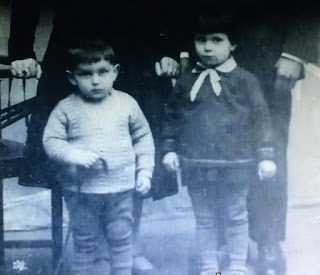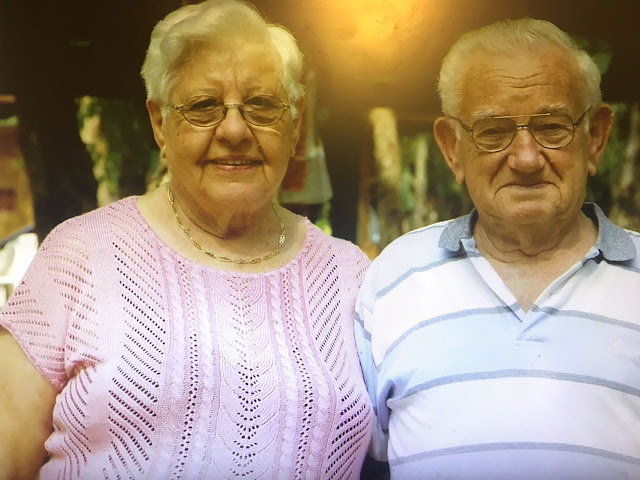RelatioNet JO SH 26 MY PO
JOSEPH SHIVEK
Holocaust Project Katzanelson High-School
Kfar saba Israel
Kfar saba Israel
mail: lederer.ziv@gmail.com
eranshachar3@walla.com
relationet2014@gmail.com
First name: Josef
Last name: Shivek
Date of birth: 1926
City of birth: Myszkow
Country of birth: Poland
MYSZKOW
Myszkow is a town in Poland,
with 33,016 inhabitants according to register in
2014. It is the capital of
Myszkow County. Myszkow historically belongs to Lesser Poland. Myszkow is
located along one of the oldest Polish rail lines - the Warsaw–Vienna railway. Near
the town there is another important rail line - the Central Rail Line. Today’s Myszkow
is made of a number of former villages, towns and settlements. The town is
located in a valley between Silesian Highlands and Polish Jura, and some of its
districts are part of the Jura Landscape Parks.
The
history of the town called Myszkow is very short, and goes back to 1925, when
the commune (district) of Myszkow was created. It was incorporated as a town in
1950, and the Myszkow County was created in 1956. After World War II (August
1945), Lesser Poland’s Myszkow was transferred to Silesian - Dąbrowa
Voivodeship, which in 1950 changed name to Katowice Voivodeship.
Between the two World Wars, there
were about 600 Jews in Myszkow that was 5 percent of its total population.
Among them were small owners of factories and businesses mainly in the food
sector , textile and iron. The community had Midrash and Talmud, a Jewish
library and an operating "Bikur Cholim".
A few days before World War II, a group of Jews
escaped Myszkow and were headed east to the area that was controlled by the Soviets.
The Germens occupied Myszkow in 9/3/39.
A ransom was imposed on the Jews, the synagogue was destroyed, Jewish shops
were confiscated and Jews were ordered to carry a white badge with the star of
David on it.
In Myszkow there was a local Judenrat
headed by Hirschberg. In October 1940, the Germans began shipping hundreds of Jews
from working in Myszkow to Work camps in and outside city. In early 1941, 50 Jews were deported to
Auschwitz, mostly former youth activists. At the end of 1942, a ghetto was
established in Mieczow. Exit of the ghetto was banned without a license from the
Gestapo. Epidemics broke out due to
the overcrowding.
In June 1942, the Gestapo
expelled Jews from the ghetto to Auschwitz, No sooner the Gestapo captured about
200 Jews who were hiding during the first deportation, those Jews had been
deported on 28 August.
From the 1200 Jews of Myszkow
that were expelled to the death camps, only 60
survived.
JOSEEPH SHIVEK 'S
I went to a Polish school. We
were only 4 Jewish kids in the class. Already back then, you could sense the Anti-Semitism. We felt we were
very lonely and different from the others. Every day, after I returned from
school, I had to be in my room all day long, which made me furious.
I used to go with my father
to the synagogue every week, until the war broke out and it became impossible.
On the first of September 39, on Friday the war broke out, and the Germens came
to Myszkov on Saturday night.
At that time, I was in the 7th grade. When the Gestapo arrived at my school, they
expelled all the Jewish children. As a result, instead of going to school, I
worked for my aunt. I should have celebrated my Bar Mitzvah at that time, but
because
of the war, it never happened.
On Friday, the first of September 39, the war broke out and
the Germen soldiers came to Myszkov on Saturday night. Germen aircrafts began
to bomb all over Poland and the occupation began.
My family feared for their security because they thought most of the
bombing would be held on Myszkov. As a result, they decided to go to my grandparents'
(my father's parents) town.
On the way to my grandparents' house, we
came across a blocked path so we had to return. We were hiding at my Polish
neighbor's basement in order to be safe
One day, a German soldier saw me jumping from the rooftops. He yelled and called me to stop. I immediately lied down and avoided him
In 42, the Jewish families had to pay taxes
according to the number of people. In the same year, deportation began to take
place in MyszkovAt that time, my father
heard that his mother, my grandmother had just died.
He wanted to go to her funeral and maybe see
her body for the last time. In addition, he thought that it would be safer
where she lived from where we were staying currently. Before he
took off, I heard one of his conversations with his brother (my uncle). They were talking about the death of their mother. My father
told him he wanted to go to her funeral and that he was planning to do that. In their conversation his brother told him: "be grateful
she died in her bed". I will never forget that sentence.
Each member of the family carried with him a
small backpack that would come in handy when he was caught. My father was
working at a factory. When I was 15 years old, he was caught by the Germens. He
had a beard and they thought he was too old and therefore not fit to work. They
put him with the old people and sent them for extermination. I had never seen
him again.
The Germens came back to Myszkov. They
ordered all the hiding Jews to get out. They informed that they would
immediately shoot those who did not get out. We
heard that and decided to keep on hiding. Some of the Jews got out. Those who
got out were sent to Auschwitz.
After a few weeks we were caught and they
sent us to Auschwitz. They boarded us on
the trains. I can still remember the sound of the crying children that their
parents have left them for their own survival. When we
arrived at Auschwitz they sorted us according to our gender and age. They
sorted us to two groups (rows): The young men, and women, babies and old
people. They ordered us to get rid of all of our belongings. During the
selection a Germen soldier came to me and asked me what my age was. I told him
I was 16 years old and he placed me with the old people. I felt that it was
dangerous so I jumped to the other row. My sister and my mother were placed
with the other group that in retrospect was sent to extermination. After I got my number on my arm, I asked one man where the
other group was sent. He pointed at the smoke that was coming out of the
chimney and I immediately understood.
In Auschwitz, I was sent to work in a
factory with more than 1000 other Jews. I was in Auschwitz for three months.
Once in a while there were selections, the skinny ones were expelled to
destruction. I was afraid the Nazis would pick me because I was small, so I
stood next to even smaller people to look normal. I was very hungry during that
time in Auschwitz, so hungry that if I had a chance to eat something I ate it.
A day before the big rebellion,
the Germans forced us to walk towards Germany. The ones who couldn’t walk were
shot to death by the Germans. After a week, we arrived at the railroad
tracks. From there we took a train to Dahar. The train was very crowded. I
sat near an S.S officer, I asked him to give me the water he bathed with; the
German spilled the water on me and called me a
dirty Jew. On the way, the train stopped near a potato field. The
commanding officer gave the
order to release the remaining Jews.
The Germans ran away and we
were free, we looked to find some food, we entered a house of German air force
control officer. We told him the war was over but he said that Germany would never
surrender, he gave us food. We arrived at a village, the Germans there wanted
to kill us, but the same officer protected us
and said nothing would be done
without an instruction.
We took a train to a town in
Austria, a day after we arrived, the Americans
arrived. We wanted revenge, but
an American officer asked me if we were like the Nazis, so
we gave up on it. There
was a separation between us and the Germans. They became workers
like the Jews were. The Americans took our clothes and burnt them, and then
they gave us a shower, pajamas and food. I still needed some clothes so I wore
a Hitler youth clothes, the only thing I could
find.
find.
I knew my father had a
brother and 2 sisters living in Israel. In the camp the Red Cross distributed
postcards, so I took one and sent it to Kfar Hess where they lived.
I immigrated to Israel through
the famous Beria, and I was in Atlit prison. In 47, I joined the
"Haganah" and later I became an IDF soldier. I participated in the 1948
Arab–Israeli War. After the war, I worked at a metal factory in Tel Aviv. I was a partner with a friend from
Europe; we have established Koprtiv Company, we were 10 men, I was working 12
hours a day.
I got married with Sophie who
I met in Hod Hasharon, where I live today. We have 3 girls Gila, Varda and Yehila
were named after my father.






